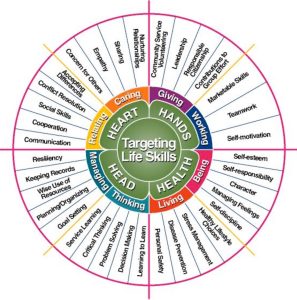All of the programs, projects, and events in our 4-H program are intended to encourage youth to learn life skills. For example: in our fair, we encourage record keeping; in archery, we teach personal safety; and in our camps, we practice cooperation.
Life Skills
The main goal of the 4-H program is to help young people develop important life skills that they can use every day. These skills are tools that help -youth handle different situations, make choices, and make their lives better. Youth learn these skills by taking part in 4-H projects or programs, where they pick up new abilities and knowledge.
In the Beginning
Originally, 4-H was mostly about teaching youth-specific skills such as gardening or raising animals. But today, it’s more about helping young people grow as individuals by learning skills that spark an interest. 4-H offers all kinds of activities and projects to get youth

involved and learning. When they do these projects, they’re not just doing something fun or interesting, they’re learning things they can use in real life. And as youth think about what they’ve learned, they get better at applying it to different situations. For example, when learning how to set goals, youth practice by writing one or two goals, and then discussing what they learned from the experience.
The Life Skill Wheel
The life skills wheel is a graphical representation of how our programs are designed and taught in 4-H. Notice how the HEAD, HEART, HANDS, and HEALTH are in the center of the wheel, and the skills are the spokes around them. Wouldn’t it be wonderful if youth could learn most of these before adulthood? That is our goal!
For more information on 4-H and any of our programs, contact your local 4-H staff member or call us in Brevard County at telephone 321-633-1702.
G. Koerner, G. Whitworth-New, 2024.
Sources
Targeting Life Skills In 4-H, Marilyn N. Norman and Joy C. Jordan, 2018. https://edis.ifas.ufl.edu/publication/4H242
 1
1
